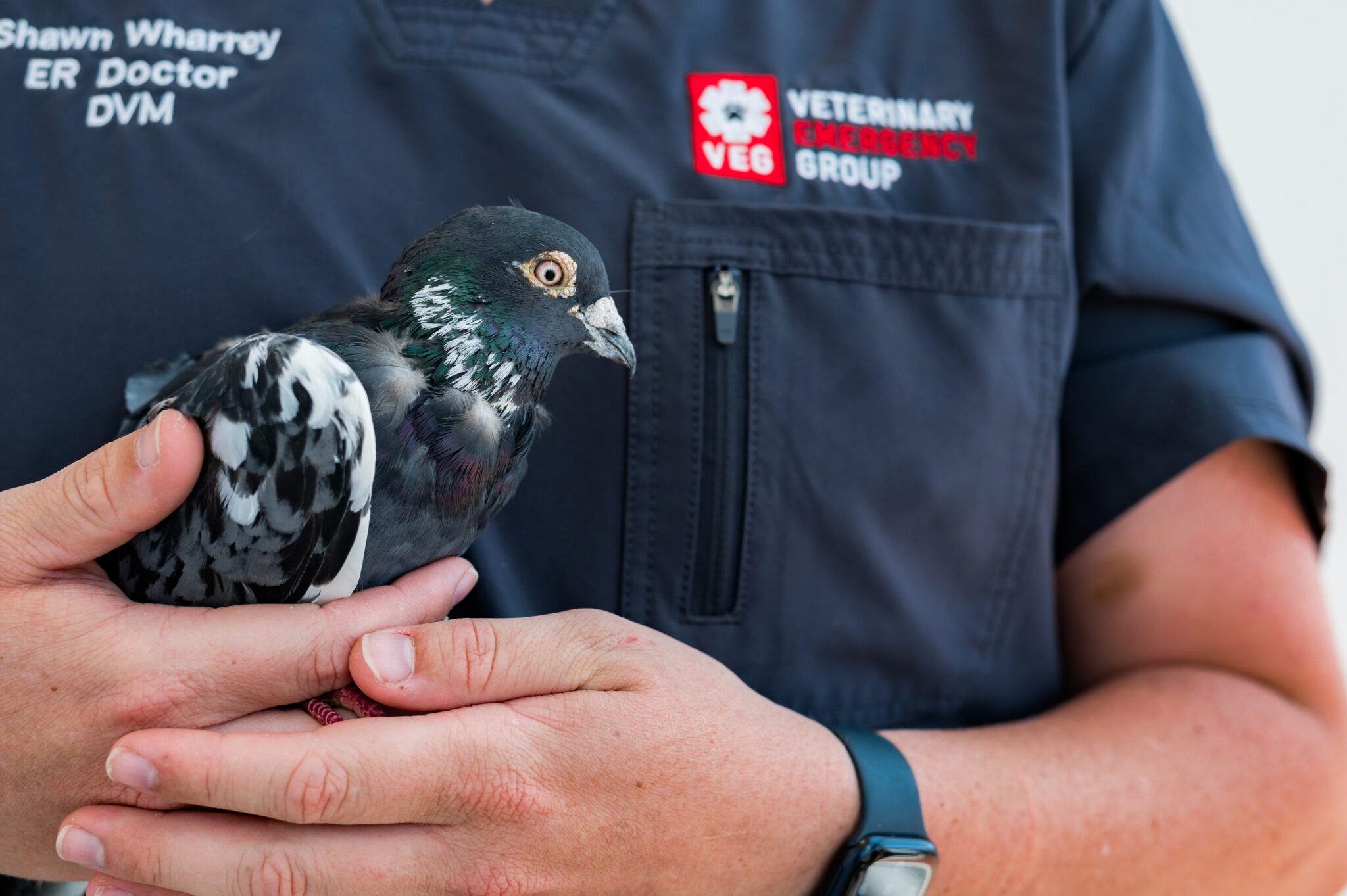
What to Do if Your Bird is on the Bottom of the Cage?
Dr. Roxana Chan
Call & Speak with a doctor Open 24/7, Even Holidays!
Walk in today for:
Emergencies
Point-of-Care Ultrasound
Urgent Care
X-Rays
Diagnostics + Testing
End-of-Life Care
Surgery
Treatment + Hospitalization
If you find your pet bird on the floor of the birdcage, your natural reaction is “Oh no!” But is it really something to worry about? It’s important to know that in some cases, it’s not truly a medical emergency, but you don’t want to brush it off either. So, talons out—let’s dig in!
Why is My Bird at the Bottom of the Birdcage?
These symptoms, among others, can indicate a true emergency when your bird is staying at the bottom of the cage:
- Fluffed up feathers
- Difficulty breathing
- Drooping wings or is favoring a limb
When birds are feeling strong and secure, they prefer to be up high in their environment. On the flip side, they’re very good at hiding their illness, and have a very high metabolic rate. This means they can lose weight rapidly when they are sick, and possibly head for the birdcage floor; it’s just easier and requires the least amount of energy.
The following are just some of the reasons your bird might be found on the bottom of the cage, and is not an exhaustive list.
Respiratory Disorders
It takes a lot of muscular movement and effort for your bird to breathe. With no diaphragm, their muscles have to “pull and push” air around their bodies. Any respiratory issue in birds can be subtle and slowly get worse, or appear to happen suddenly. Weakness can occur, resulting in your bird saving energy by not perching and taking to the bottom of the cage. For more on respiratory disease in birds, read this.
Reproductive Disorders
Knowing your bird’s gender and reproductive status can be extremely helpful when bringing them to a vet for medical attention, but it can be tricky. A bird can lay eggs even if she is not exposed to a male bird. And for many types of parrots, it’s not possible to know the sex just by looking at them! A female bird on the bottom of the cage may be “egg bound” or have “dystocia,” meaning difficulty laying an egg. The longer she remains in this state, the more critically ill she can become. Some common causes of an egg bound bird are malnutrition, breed, and age. For example, seeds lack calcium, vitamin D, vitamin E, and many other essential nutrients necessary for the hard work of reproduction. So, birds on a primarily seed-based diet typically lack the nutrients to repeatedly make and produce eggs, and their bodies tire out.
Symptoms That Your Bird is Egg Bound Include:
- being on the bottom of the cage rather than perching
- weakness or lethargy
- swelling of the belly
- standing abnormally
- breathing abnormally
- changes in droppings, straining, bleeding or having some of the egg/cloacal tissue protruding from the vent
If you note any of the symptoms above, bring them to VEG or the nearest vet as soon as possible.
Trauma & Fractures
Bite wounds (from other animals or other birds), self mutilation, thermal burns, fractures, and blood feather injury can lead to pain, blood loss, and/or infection in your pet bird, which can cause them to feel sick quickly.
If you notice any active bleeding, pain, or injuries, it is important to seek medical attention at VEG or veterinary hospital that handles avian emergencies. A full physical exam should be performed to assess for injuries, attempt to stop any active bleeding if present, treat pain, or prevent infection if appropriate. After helping to stabilize your bird, additional diagnostics and treatments may be recommended depending on the injury. It is highly recommended to follow up with your primary care veterinarian for continued care.
Metabolic or Neurologic Disorders
Birds can become ill due to gastrointestinal issues, disease of their major organs (heart, liver, kidneys), bacterial or viral infections, toxin exposure, improper husbandry, seizures, or even various forms of cancer. An emergency veterinarian can help stabilize your bird and keep them comfortable until your primary/exotics veterinarian is available to perform diagnostics.
Take Your Bird to the Vet
In addition to the above issues, if you notice your bird is doing any of the following, take them to an avian specialist or your primary vet to be assessed:
- Losing weight
- Not eating or drinking
- Has abnormal droppings
- Has abnormal movements or posture
A veterinarian will determine and treat the underlying cause of your bird’s symptoms. At VEG, we can help stabilize, alleviate pain, and support your bird until it can be seen by a primary veterinarian for further evaluation.
So, When is it Nothing to Worry About?
We’ve covered a few serious issues, but here are some non-emergency reasons:
Behavioral / Food Seeking
Toys, food, or paper to shred can bring a bird to the cage floor; it’s where the action is.
Temperature
If the room is too warm, your pet may be seeking a cool surface. Conversely, if the ambient temperature is too cool, they may think the floor provides warmth. Try to keep the room temperature appropriate for your type of bird, approx. 68-80 degrees.
Hormones
Your bird may think the cage floor is a fine nesting spot.
Contact VEG if Your Bird is Experiencing an Emergency
It’s best to have a professional immediately evaluate your pet to see why your bird is drawn to the bottom of the birdcage. Birds can become very stressed when ill, and these illnesses can potentially be fatal if not addressed by a knowledgeable medical professional. VEG understands that emergencies can happen at any time, and that exotic pets often require unique handling and care. We have highly trained emergency doctors available to answer your questions and assist your pet 24/7.

